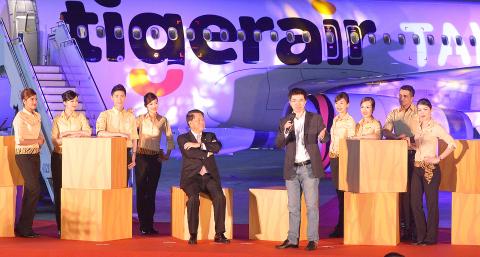China Airlines Ltd (CAL, 中華航空) yesterday announced it is to set up a low-cost carrier venture with Tiger Airways Pte of Singapore and plans to launch operations in the fourth quarter next year.
The joint venture, which has a paid-up capital of NT$2 billion (US$67.33 million), is to run a budget airline under the brand Tigerair Taiwan, which is licensed by Tiger Airways and based at the Taiwan Taoyuan International Airport.
NORTHEAST ASIA

Photo: Yao Chieh-hsiu, Taipei Times
Tigerair Taiwan aims to be a no-frills carrier providing international air travel services across Northeast Asia, including Japan, South Korea and the second-tier and third-tier cities of China.
“China Airlines’ knowledge of the Taiwan market, coupled with Tiger Airways’ expertise in the no-frills sector, should stimulate demand in the civil aviation market here,” CAL chairman Sun Hung-hsiang (孫洪祥) told a press conference.
CAL is not the only airline in Taiwan planning to enter in the low-cost carrier market.
Last month, TransAsia Airways Corp (TNA, 復興航空), which mainly serves passengers on regional and cross-strait routes, said it would establish a budget airline subsidiary within one year to meet rising demand.
The company, which mainly serves passengers on regional and cross-strait routes, said it planned to invest between NT$2 billion and NT$3 billion to operate the subsidiary.
Sun said CAL and Tiger Airways are submitting an application for regulatory approvals from the Ministry of Economic affairs and the Civil Aeronautics Administration (CAA), aiming to operate as quickly as possible.
In addition, the launch of Tigerair Taiwan will help increase CAL’s sales performance and profitability, Sun said, as CAL holds a 90 percent share in the new carrier, with its Singapore partner taking the other 10 percent.
Sun expressed optimism that Tigerair Taiwan will “absolutely” turn profit after three years of operation, with the company aiming to break even in its first year of operation.
INITIAL THREE PLANES
Tigerair Taiwan plans to buy three Airbus SAS’ 320 series aircraft, with the fleet expected to total 12 planes in 2016 or 2017.
The new joint venture is to allow Tiger Airways to extend its presence into new untapped markets in Northeast Asia, chief executive officer Koay Peng-yen (郭炳炎) said.
Tiger Airways Holding Ltd currently operates a fleet of 50 aircraft to over 50 destinations, from its bases in Singapore, Indonesia, the Philippines and Australia, while CAL operates a fleet of 75 aircraft to 109 domestic and international destinations in its network.

TARIFFS: The global ‘panic atmosphere remains strong,’ and foreign investors have continued to sell their holdings since the start of the year, the Ministry of Finance said The government yesterday authorized the activation of its NT$500 billion (US$15.15 billion) National Stabilization Fund (NSF) to prop up the local stock market after two days of sharp falls in reaction to US President Donald Trump’s new import tariffs. The Ministry of Finance said in a statement after the market close that the steering committee of the fund had been given the go-ahead to intervene in the market to bolster Taiwanese shares in a time of crisis. The fund has been authorized to use its assets “to carry out market stabilization tasks as appropriate to maintain the stability of Taiwan’s

STEEP DECLINE: Yesterday’s drop was the third-steepest in its history, the steepest being Monday’s drop in the wake of the tariff announcement on Wednesday last week Taiwanese stocks continued their heavy sell-off yesterday, as concerns over US tariffs and unwinding of leveraged bets weighed on the market. The benchmark TAIEX plunged 1,068.19 points, or 5.79 percent, to 17,391.76, notching the biggest drop among Asian peers as it hit a 15-month low. The decline came even after the government on late Tuesday authorized the NT$500 billion (US$15.2 billion) National Stabilization Fund (國安基金) to step in to buoy the market amid investors’ worries over tariffs imposed by US President Donald Trump. Yesterday’s decline was the third-steepest in its history, trailing only the declines of 2,065.87 points on Monday and

TARIFF CONCERNS: The chipmaker cited global uncertainty from US tariffs and a weakening economic outlook, but said its Singapore expansion remains on track Vanguard International Semiconductor Corp (世界先進), a foundry service provider specializing in producing power management and display driver chips, yesterday withdrew its full-year revenue projection of moderate growth for this year, as escalating US tariff tensions raised uncertainty and concern about a potential economic recession. The Hsinchu-based chipmaker in February said revenues this year would grow mildly from last year based on improving supply chain inventory levels and market demand. At the time, it also anticipated gradual quarter revenue growth. However, the US’ sweeping tariff policy has upended the industry’s supply chains and weakened economic prospects for the world economy, it said. “Now

An employment discrimination lawsuit against contract chipmaker Taiwan Semiconductor Manufacturing Co (TSMC, 台積電) might soon be expanded after a hearing in a federal court in San Jose, California, on Tuesday to add 15 plaintiffs to the case. According to a court document, the lawsuit, which was refiled in November last year as a form of a class action with 13 plaintiffs in California, wants to add 15 plaintiffs from Arizona, where TSMC is building up its wafer fab capacity. TSMC first committed between 2020 and last year to invest US$65 billion in three advanced wafer fabs in Arizona. It then pledged an